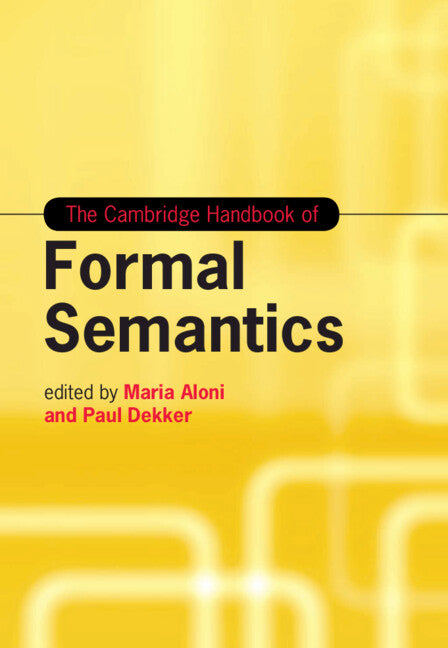Freshly Printed - allow 8 days lead
Couldn't load pickup availability
The Cambridge Handbook of Formal Semantics
This comprehensive Handbook presents an interdisciplinary overview of formal semantics, with contributions from leading scholars.
Maria Aloni (Edited by), Paul Dekker (Edited by)
9781107028395, Cambridge University Press
Hardback, published 7 July 2016
938 pages, 15 b/w illus. 8 tables
25.4 x 18.4 x 4.5 cm, 1.98 kg
'After half a century of intensive research, formal semantics has become a mature discipline taught in most linguistics departments. The Amsterdam people were among the pioneers, and they offer us what is most needed today: a comprehensive handbook covering the entire field, each chapter of which is written by a world expert. A must read for anyone interested in language.' Francois Recanati, Institut Jean Nicod, Paris
Formal semantics - the scientific study of meaning in natural language - is one of the most fundamental and long-established areas of linguistics. This Handbook offers a comprehensive, yet compact guide to the field, bringing together research from a wide range of world-leading experts. Chapters include coverage of the historical context and foundation of contemporary formal semantics, a survey of the variety of formal/logical approaches to linguistic meaning and an overview of the major areas of research within current semantic theory, broadly conceived. The Handbook also explores the interfaces between semantics and neighbouring disciplines, including research in cognition and computation. This work will be essential reading for students and researchers working in linguistics, philosophy, psychology and computer science.
Part I. The Landscape of Formal Semantics: 1. Formal semantics Barbara H. Partee
2. Lexical semantics James Pustejovsky
3. Sentential semantics Peter Pagin
4. Discourse semantics Nicholas Asher
5. Semantics of dialogue Jonathan Ginzburg
Part II. Theory of Reference and Quantification: 6. Reference Paul J. E. Dekker and Thomas Ede Zimmermann
7. Generalized quantifiers Dag Westerståhl
8. Indefinites Adrian Brasoveanu and Donka F. Farkas
9. Plurality Rick Nouwen
10. Genericity Ariel Cohen
Part III. Temporal and Aspectual Ontology and Other Semantic Structures: 11. Tense Atle Grønn and Arnim von Stechow
12. Aspect Susan Rothstein
13. Mereology Lucas Champollion and Manfred Krifka
14. Vagueness Hans Kamp and Galit W. Sassoon
15. Modification Louise McNally
Part IV. Intensionality and Force: 16. Negation Henriëtte de Swart
17. Conditionals Paul Egré and Mikaël Cozic
18. Modality Lisa Matthewson
19. Questions Paul Dekker, Maria Aloni and Jeroen Groenendijk
20. Imperatives Paul Portner
Part V. The Interfaces: 21. The syntax-semantics interface Manfred Sailer
22. The semantics-pragmatics interface Philippe Schlenker
23. Information structure Enric Vallduví
24. Semantics and cognition Giosuè Baggio, Keith Stenning and Michiel van Lambalgen
25. Semantics and computation Matthew Stone.
Subject Areas: Computational linguistics [CFX], Semantics, discourse analysis, etc [CFG], Philosophy of language [CFA]


